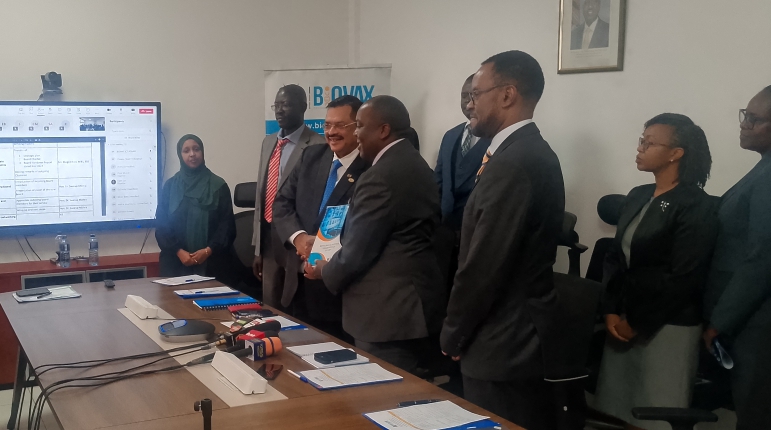
The newly appointed Kenya Biovax Institute (KBI) board chairperson, Swarup Mishra Kenya Biovax Institute (KBI) board chairperson Swarup Mishra has officially assumed office.
Mishra takes over from Mugo Kibati, who has been at the helm of the agency for the last three years.
KBI, which is a state agency under the Ministry of Health, was established in 2021 at the height of the COVID-19 pandemic.
Its role is to manufacture and commercialize human vaccines and other health products and technologies.
This was informed by the challenges faced by African countries in search of vaccines during the period, hence the need to “domestic human vaccines.”
The former Kesses MP was appointed through a Gazette Notice by President William Ruto last week.
The handover ceremony was held at the institute’s offices at Embakasi in Nairobi.
In his address during the event, Mishra thanked the President for appointing him as he committed to delivering on his mandate.
He said with Kenya being the leading nation in Africa in the manufacture of pharmaceuticals, surgical products, disposables, and high-end health products—both preventive and curative—which has now led to costs being reduced, they hope to be ambassadors to other countries.
Mishra further stated that with the modern technology, Kenya can also become the first African nation to achieve gene therapy and even stem cell therapy to treat cancer which is preventive just like a vaccine.
“This has been achieved by only three countries which are Italy, USA and India,” he said.
Kibati, on his part, reckoned the strides made since the establishment of the agency noting they managed to put in place the necessary human resources structures for the institute to operate.
“We have been able to recruit and set up a senior management team of experts in the therapeutics area and field; we have several managers in this field,” he said.
“We have also established the premises where we are today and also facilitated the enabling works for the construction of the first facility for production of the human vaccines in the country.”
According to Kibati, human vaccine production is a very sensitive endeavor, noting that the level of safety and security required of a vaccine production plant is high.
Kibati stated “the process is very meticulous and deliberate, we need to have a good manufacturing consultancy to help us have a facility that is safe and secure when it is eventually completed.”
Kibati at the same time revealed that they have secured $80 million (Sh10.3 billion) for the construction of the plant to be completed by 2026.
The institute’s CEO Michael Lusiola stated that by early 2025 they will begin the civil engineering works for the assembly and installation of the machinery for field works.
The Kenya Medical Research Institute (Kemri), which is represented in the KBI board was in the forefront in conceptualising the creation of the institute.
Kibati at the same time once complete, the facility will not only play a crucial role in ensuring the government’s objective of realizing the Universal Health Coverage (UHC) succeeds but also make a regional hub in terms of health services.


 © The Star 2024. All rights reserved
© The Star 2024. All rights reserved